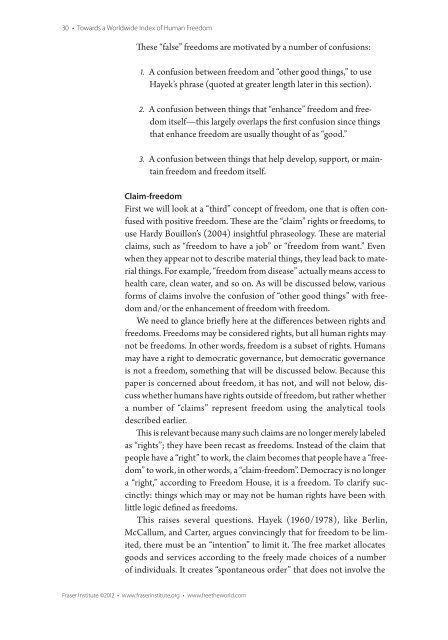Towards a Worldwide Index of Human Freedom
Towards a Worldwide Index of Human Freedom
Towards a Worldwide Index of Human Freedom
Create successful ePaper yourself
Turn your PDF publications into a flip-book with our unique Google optimized e-Paper software.
30 • <strong>Towards</strong> a <strong>Worldwide</strong> <strong>Index</strong> <strong>of</strong> <strong>Human</strong> <strong>Freedom</strong><br />
These “false” freedoms are motivated by a number <strong>of</strong> confusions:<br />
1. A confusion between freedom and “other good things,” to use<br />
Hayek’s phrase (quoted at greater length later in this section).<br />
2. A confusion between things that “enhance” freedom and freedom<br />
itself—this largely overlaps the first confusion since things<br />
that enhance freedom are usually thought <strong>of</strong> as “good.”<br />
3. A confusion between things that help develop, support, or maintain<br />
freedom and freedom itself.<br />
Claim-freedom<br />
First we will look at a “third” concept <strong>of</strong> freedom, one that is <strong>of</strong>ten confused<br />
with positive freedom. These are the “claim” rights or freedoms, to<br />
use Hardy Bouillon’s (2004) insightful phraseology. These are material<br />
claims, such as “freedom to have a job” or “freedom from want.” Even<br />
when they appear not to describe material things, they lead back to material<br />
things. For example, “freedom from disease” actually means access to<br />
health care, clean water, and so on. As will be discussed below, various<br />
forms <strong>of</strong> claims involve the confusion <strong>of</strong> “other good things” with freedom<br />
and/or the enhancement <strong>of</strong> freedom with freedom.<br />
We need to glance briefly here at the differences between rights and<br />
freedoms. <strong>Freedom</strong>s may be considered rights, but all human rights may<br />
not be freedoms. In other words, freedom is a subset <strong>of</strong> rights. <strong>Human</strong>s<br />
may have a right to democratic governance, but democratic governance<br />
is not a freedom, something that will be discussed below. Because this<br />
paper is concerned about freedom, it has not, and will not below, discuss<br />
whether humans have rights outside <strong>of</strong> freedom, but rather whether<br />
a number <strong>of</strong> “claims” represent freedom using the analytical tools<br />
described earlier.<br />
This is relevant because many such claims are no longer merely labeled<br />
as “rights”; they have been recast as freedoms. Instead <strong>of</strong> the claim that<br />
people have a “right” to work, the claim becomes that people have a “freedom”<br />
to work, in other words, a “claim-freedom”. Democracy is no longer<br />
a “right,” according to <strong>Freedom</strong> House, it is a freedom. To clarify succinctly:<br />
things which may or may not be human rights have been with<br />
little logic defined as freedoms.<br />
This raises several questions. Hayek (1960/1978), like Berlin,<br />
McCallum, and Carter, argues convincingly that for freedom to be limited,<br />
there must be an “intention” to limit it. The free market allocates<br />
goods and services according to the freely made choices <strong>of</strong> a number<br />
<strong>of</strong> individuals. It creates “spontaneous order” that does not involve the<br />
Fraser Institute ©2012 • www.fraserinstitute.org • www.freetheworld.com


